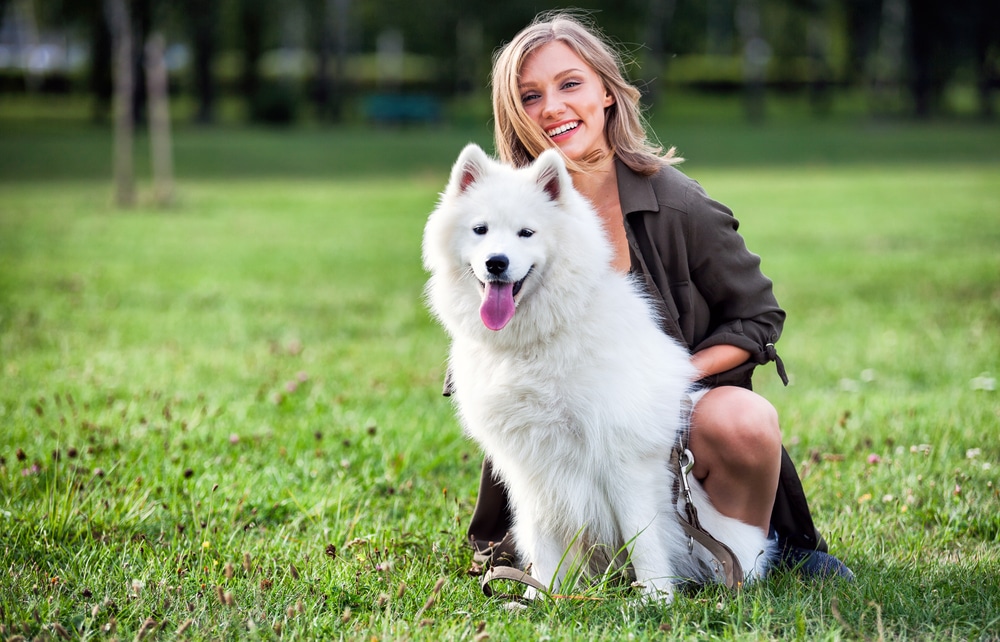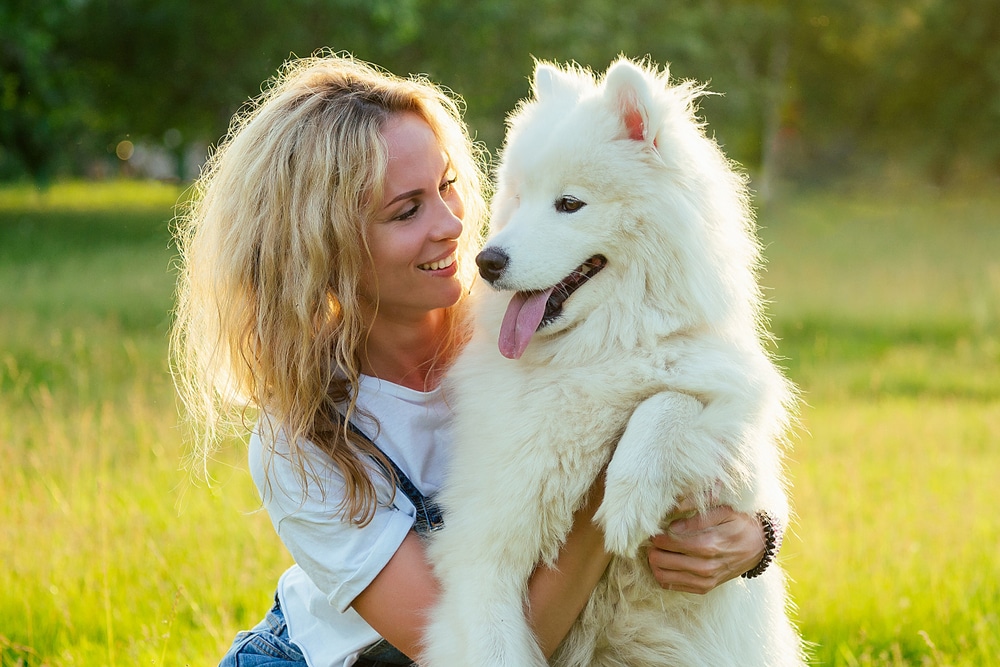As irresistible furry white puppies with little button noses and black eyes, Samoyeds are one of the cutest dogs ever. Known as the smiling sled dog, many people consider the Samoyed a great family addition and a first choice when getting a dog. But, have you asked yourself why Samoyeds make such good dogs?
Samoyeds make good dogs because they have huge personalities to match their fluffy coats and are a loving and devoted breed. This breed is famous for forming incredibly strong and loyal bonds with its owners, especially kids. Furthermore, they are smart, loyal, energetic, and easy to train. Let us get into the details of this loving, family-friendly breed.
Table of Contents
The History Of Samoyeds
Samoyedic people were semi-nomadic people from Asia who came to Siberia a thousand years ago. In the coldest inhabited regions in the world, they developed dogs for hard labor and hunters to provide for their families.
This dog’s duties included hiking with the pack, tracking, and pulling the sled. It is said that the Samoyed took good care of these working dogs and allowed them to take part in family activities at the end of the day.
During the frigid Arctic nights, the Samoyed people camped out and cuddled together with their dog packs for warmth. This closeness and mutual need to cooperate in order to survive helped to develop the breed’s enduring sense of loyalty and trust.
The Samoyed dog breed as we know it today may have its roots in the Soviet Nenet Herding Laika. The early European explorers rapidly recognized the usefulness of these sturdy canines.
In the late 1800s, Samoyeds arrived in England as presents from the Russian Emperor. Queen Alexandra was a fan and contributed significantly to promoting the breed as a companion and show dog.
Originally, these multipurpose canines came in a number of colors, but most places in the world now prefer the brilliant white version.
The Samoyed’s Physical Traits
The Samoyed is a medium-sized dog, standing between 19 and 23 1/2 inches (46-56 cm) tall and weighing between 50 and 65 pounds (23 to 29 kilograms).
The Samoyed breed’s crowning glory is its brilliant white coat. This breed has a thick, rough, straight coat with an extremely full undercoat, as one might anticipate for a breed with northern origins. An owner will need to completely brush their coat weekly to maintain it.
The good news is that Samoyeds’ fur often has no dog smell, so you won’t have to worry about it when adopting one.
Despite having a white coat, Samoyeds have lovely black coloration around their eyes, nose, and lips, and a fluffy tail that hangs to one side and curls over the back.
Their prickly ears, foxy face, thick coat, and curled tail are “spitz-like.” Also, this fluffy white doggo will make your home a better place for 10 to 12 years.
A Samoyed’s characteristic smile reveals its friendly, good-natured character. To create the recognizable “Sammie smile,” the corners of the lips fold upward.
The Personality Of Samoyeds

Sammies are not only incredibly attractive but also quite useful. They can withstand the cold and are hardworking and agile.
Samoyeds also have a unique personality. The Samoyed breed is friendly, eager to cuddle, gentle, and loyal. A well-bred Samoyed is a devoted, kind, and intelligent canine.
If you consider adopting a Samoyed, be aware they can get noisy and chew if left unattended. The best course of action is to never leave them alone for more than four hours at a time since they can begin to feel agitated and anxious.
Keep in mind that personality traits like temperament are inherited less predictably than physical traits like size or shedding. How they’re trained and raised also shapes their behavior and temperament.
Training And Socialization
This breed is renowned for forming incredibly strong and devoted relationships with its owners. In order to ensure that your Samoyed puppy develops into a well-rounded dog, socialization is important.
The Samoyed needs early socialization, or exposure to a variety of people, sights, sounds, and experiences when they’re young, much like every other dog. Samoyeds require numerous chances to blow off steam. Otherwise, they’ll get bored and agitated.
When it comes to training, Samoyeds have a tendency to be highly independent, so it’s crucial to begin using positive reinforcement as soon as possible. They pick things up quickly and are suited for active families where they can exercise a lot together.
The Samoyed is smart, noble, and family-friendly.
Although a Samoyed is affectionate with everyone in the pack, it frequently chooses to adore one particular family member.
Samoyeds are still mostly hunters too. They will likely chase after small animals they consider prey. For its safety, it must always be on a leash when it is outside of its fenced-in yard.
The placid Samoyed likes the companionship of other canines as well. This is particularly true if the person who reared it did so with other dogs from a young age.
Also, Samoyeds and cats are accustomed to getting along quite fine when they grow up with one another, but it’s still a good idea to watch them together.
Just to mention it, stay especially aware during hikes since Samoyeds have a strong prey drive and may drag you through fields if they notice something in the distance.
Adding A Samoyed To Your Family
Samoyeds are wonderful creatures, but like with any breed, there are unique factors for their care and happiness that you’ll need to consider before making the decision to purchase or adopt one.
They require frequent grooming, a lot of exercise, and an owner who is prepared to invest the necessary time in developing a deep bond with them. A Samoyed puppy will be a fantastic addition to your home and bring you and your family years of companionship and joy if you can meet those requirements.
Samoyeds are lovely dogs, but they can also have health issues like any other breed. Hip dysplasia, diabetes, and eye issues are a few of the things frequently related to them.
Since Samoyeds are a working breed, they can occasionally be stubborn too, but at the end of the day, they make loving, kind, and devoted family dogs above all else.
In Conclusion: Why Do Samoyeds Make Good Dogs?
Both a privilege and a duty come with owning a dog. Before getting a dog, you must make sure you know how much of a commitment it is.
Samoyeds have a huge personality that matches their fluffy coats and are a loving and devoted breed. People like them as family pets since they get along well with older kids. People also adore them for their attractive looks and positive personality, but they can be a lot of work too.
So, are you still considering getting a Samoyed? What are you waiting for?
In case you own a Samoyed, we are curious. What do you love the most about your Sammy? Why do Samoyeds make good dogs? Let us know in the comments!
